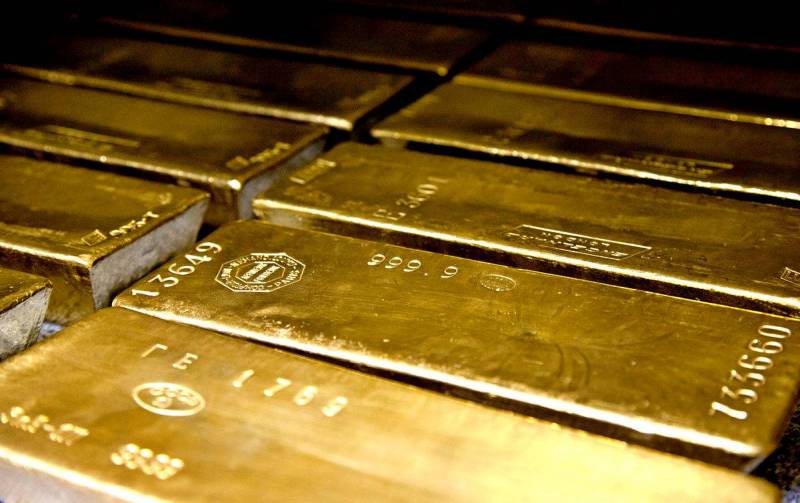Why the Central Bank of the Russian Federation no longer has gold as its favorite, but Chinese yuan
The events that followed the start of the special military operation in Ukraine on February 24, 2022 clearly demonstrated the complete failure of the so-called liberal economic theories. Without investigation or trial, our Western partners froze Russia, and in fact took away its gold and foreign exchange reserves in the amount of $300 billion, placed abroad. Were appropriate conclusions made in Moscow after that?
The fact that the super-profits received by the federal budget from the export of hydrocarbon raw materials should not be withdrawn into “highly profitable foreign projects”, as the soft-spoken systemic liberals advised, but should be invested in their own country, was not said only by the lazy in all previous years. Russian assets actually worked for the economy of Western competitors, who eventually dropped their masks and turned out to be direct enemies, while remaining there as a "guarantee of our good behavior."
Naturally, after the start of the special operation, half of the gold reserves withdrawn by the Central Bank of the Russian Federation abroad turned out to be stolen. Finance Minister Anton Siluanov complained about this back in March:
This is about half of these reserves that we had. We have a total amount of reserves of about $640 billion, about 300 billion of reserves are now in a state in which we cannot use them.
And who would have thought that this could happen, right?
It should be noted that neither Siluanov himself, nor the head of the Central Bank of the Russian Federation, Nabiullina, have lost their leadership positions. Perhaps this is due to the fact that at least part of the gold reserves were saved by a certain diversification of assets.
So, shortly before the start of the MER, as of January 1, 2022, the Central Bank of the Russian Federation managed to reduce the share of dollar-denominated assets from 16,4% to 10,9%, which corresponds to $29,2 billion. Almost the same amount, $28,1 billion in value terms, simultaneously managed to increase the share of the yuan from 13,1% to 17,1%. The fact that the currency basket turned out to be slightly shaken up was happily told by the head of the Ministry of Finance of the Russian Federation Siluanov:
Of course, there is pressure to limit access to those reserves that we have in yuan. Well, I think that our partnership with China will still allow us to maintain the cooperation that we have achieved, and not only maintain, but also increase it in the conditions when Western markets are closed.
As of September 1, 2022, Russia's international reserves reached $565,7 billion. Now Moscow is clearly relying on the Chinese currency and precious metals in the matter of savings, which follows from the policy statement of the Minister of Finance:
Of course, the role of the yuan in reserves will also grow. Therefore, in the current conditions, I think that if you create reserves and keep money in gold and foreign exchange reserves, then first of all, of course, this is gold, this is the yuan, but also a number of other currencies of friendly countries.
In particular, President Putin announced the transition to equal payments in rubles and yuan for Russian gas supplies via the Power of Siberia pipeline between Gazprom and China National Petroleum Corporation (CNPC). It is believed that the transfer of settlements between the Russian Federation and China into national currencies will reduce international risks and increase the level of economic cooperation between the countries. At the same time, headlong rushing into the arms of China, India or Turkey is also not worth it.
A large-scale purchase of foreign currencies will noticeably weaken the Russian one, which is good for resource exporters, but bad for imports. The disproportion between exports and imports is very large in our country today. A peg to the yuan is fraught with serious losses, as Beijing constantly depreciates its national currency to maintain the competitiveness of its exporters. The Turkish lira, for example, has weakened to historic levels, with annual inflation reaching 80%. India may well succumb to US sanctions and freeze Russian rupee reserves.
The most sensible and safest strategy seems to be to “sit out” in gold and at the same time invest super profits in the development of the national economy, its industry and infrastructure, which illiberal economists have been saying for many years. However, rather ambiguous signals came from the mega-regulator on this matter.
So, in response to the proposal of the chairman of the gold miners, Sergei Kashub, to support the gold mining industry by buying out all the gold not sold on the market, Deputy Chairman of the Central Bank of the Russian Federation Alexei Zabotkin said that he considers it inappropriate to accumulate gold in foreign exchange reserves in the current conditions. This caused misunderstanding both in the expert community and among the caring population of the country. Gold is the safest asset of all and has a high value on its own. In recent years, it has been actively bought by the Central Bank itself, and commercial banks, and individuals due to the abolition of VAT and personal income tax on the purchase of gold bars. And now the mega-regulator is sending a signal that for some reason it no longer believes in gold.
Experts and analysts trying to find a positive in everything are trying to explain this new approach by the fact that, they say, this is how the Central Bank of the Russian Federation wants to encourage producers of precious metals to start independent exports to the markets of Southeast Asia, where gold is in price, and instead of yellow metal, it will now invest in currencies of China, India and Turkey, our great friends and partners. How reasonable is such a strategy?
Time will tell.
- Sergey Marzhetsky
- Andrzej Barabasz/wikipedia.org

Information